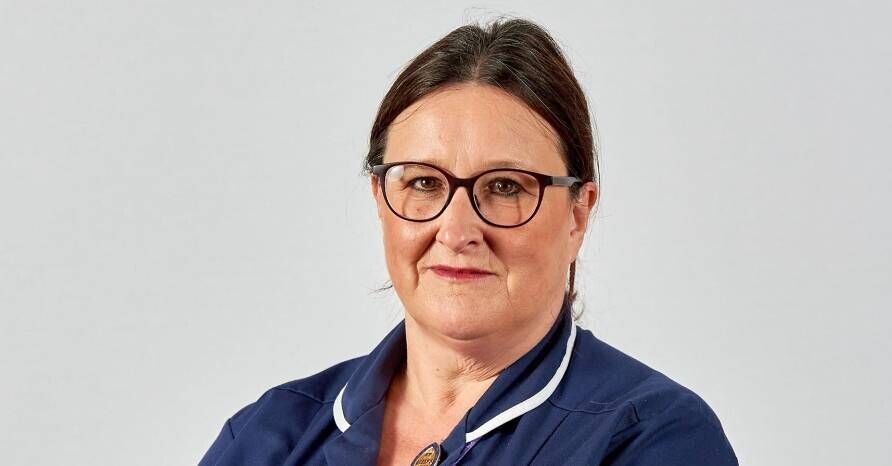We must celebrate what’s good about nursing in general practice

 Dr Helen Anderson reflects on the research she has led exploring nursing in general practice, which has demonstrated the strengths of nurse role and benefits to patients, as well as sharing thoughts from her time as a general practice nurse and advanced nurse practitioner. This article is part of the How Nurses Count series.
Dr Helen Anderson reflects on the research she has led exploring nursing in general practice, which has demonstrated the strengths of nurse role and benefits to patients, as well as sharing thoughts from her time as a general practice nurse and advanced nurse practitioner. This article is part of the How Nurses Count series.
We often hear of the problems facing general practice ranging from increased workload, funding issues, the expectation to do more with less, recruitment and retention issues, deprofessionalisation agendas and loss of public support.1,2,3,4
Nurses in general practice face their own unique set of issues, often related to employment terms and conditions, with most nurses working in general practice being employed directly by general practitioner partners and managed by non-clinical managers, both of whom do not always understand the unique position and knowledge of nurses in general practice.1
Understanding what these important members of practice teams do, and what they value in their role, could help employers and policy makers support nurses to join and stay in general practice.
It may also show those nurses who don’t work in general practice what a positively challenging, vibrant and interesting career it is.
So, let’s celebrate what’s good about nursing in general practice…
What do nurses find joyful about working in general practice? It might be surprising that it’s actually quite a lot. Having previously spent most of my clinical career as a general practice nurse and then as an advanced nurse practitioner in general practice, I know that general practice has a lot to offer nurses working within it.
Related Article: Interview: New QICN chief on priorities, challenges and the 10-year plan
In the latter part of my career, I have worked as a research fellow, predominantly interviewing nurses and nursing team members to find out about their experiences of working in general practice5,1 and it seems there is still a lot to enjoy and celebrate.
Having spent a lot of my research work highlighting the difficulties facing nurses in general practice, here are some of the things that nurses tell me brings them job satisfaction and – yes – joy in what they do. This is not to discount the very real issues nurses working in general practice face, but to highlight the positive aspects which are often overlooked.
Central to nursing in general practice is the relationship nurses share with their patients and the wider community
Central to nursing in general practice is the relationship nurses share with their patients and the wider community. This is highly valued by both nurses and patients. Nurses often develop long term relationships with patients and their families over a professional lifetime. There is pride in remembering giving a baby their first protective immunisations and later sending them off to university with their immunisation status updated and providing a whole host of other advice and support, then perhaps immunising the patient’s own baby in future years.
Nurses in general practice are rightly proud of their public health and prevention role. From delivering childhood immunisations, to providing sexual health services, working in different and novel ways to deliver cervical cytology screening, to the central leadership role they played in organising and delivering the Covid-19 vaccination programme, nurses are central to population health. Not forgetting the ongoing organisation and running of flu, pneumonia and other vaccination campaigns, as well as managing complex travel health needs and their role in secondary prevention. Practices, and communities, rely on the nursing contribution to make this provision safe and efficient and nurses value delivering such care effectively.
The therapeutic relationship between nurses and patients living with long term conditions not only provides continuity and access to skilled and knowledgeable care for patients close to home but also gives nurses a great deal of job satisfaction. This is because they see over time the difference they make to people’s lives.
They enjoy the holistic nature of the care they provide, both as a consequence of these relationships, and because of their wider knowledge of the local community.
They are highly skilled in supporting patients to manage diabetes, asthma, COPD, cardiovascular disease and chronic kidney disease among other conditions. This also illustrates another aspect of working in general practice that nurses value – the highly skilled nature of their complex work.
They are rightly proud of, the complexity of the care they provide for the benefit of patients
While their work can be challenging, they relish, and are rightly proud of, the complexity of the care they provide for the benefit of patients, not least because it taxes them intellectually.
Nurses I have spoken to value the opportunity to learn and develop and they point out that they have educational and training opportunities which are not as readily available to others, such as those working in secondary care. This often includes gaining prescribing qualifications and supports increased clinical autonomy.
Related Article: What we know so far about the government’s nurse ‘Graduate Guarantee’
This is significant as nurses working in general practice often find their way there because it fits in with caring or other responsibilities and it is an important way of developing and maintaining a vibrant and satisfying career balanced with their wider needs and responsibilities. Furthermore, this support can run throughout the nursing team, with practices supporting healthcare assistant training, nursing associate apprenticeships and opportunities to undertake registered nurse and advanced practice qualifications. For some members of the nursing team, this access to professional qualifications would otherwise be unachievable, so can be seen to challenge inequality.
Nurses also love the variety of their work and the opportunity to be ‘specialist generalists’.
They have a wide range of knowledge and skills and provide care across the life cycle, or as the previous CEO of the Queen’s Institute for Community Nursing, Dr Crystal Oldman, says, ‘from sperm to worm’.6 There are few nursing roles where you get the opportunity to work across the lifespan and across such a range of conditions from acute to long term care, from minor to serious illness, encompassing mental and physical health, from prevention to treatment, from hands on ‘caring for’ work such as wound care, to more arm’s length ‘caring about’ strategic roles.7
Nurses have also been responsible for adapting their consultations to work remotely and ‘virtually’ during the Covid-19 pandemic and beyond8, as well as pioneering new ways of working such as group consultations.9
The intrinsic motivation of the feeling of ‘doing a good job’ reflects professional values and makes people stay in their role.10 Nurses in general practice do a good job in so many ways and for so many people and this is what motivates nurses in general practice to get up and do what they do every day. There needs to be better recognition of the expertise and the value of what they do and supportive environments within which to make their working lives more amenable to enhancing the aspects of work that nurses enjoy and are good at.
We also need to address what nurses find difficult about general practice, and I have written about this elsewhere.5,1 But, for now, for the future of nursing in general practice, let’s highlight what is beneficial, enjoyable and fun.
How Nurses Count!
This article is part of the How Nurses Count campaign, showcasing the impact of nurses in general practice.
Related Article: Lower limb care in general practice: ‘It’s about giving people their lives back’
 Dr Helen Anderson is registered nurse and research fellow at the University of York says:
Dr Helen Anderson is registered nurse and research fellow at the University of York says:
‘There are few nursing roles where you get the opportunity to work across the lifespan and across such a range of conditions from acute to long term care, from minor to serious illness, encompassing mental and physical health, from prevention to treatment, from hands on ‘caring for’ work such as wound care, to more arm’s length ‘caring about’ strategic roles.’
Dr Helen Anderson is registered nurse and research fellow at the University of York.
References
- Anderson H, Brady L, Adamson J. Exploring the relationship between cultural and structural workforce issues and retention of nurses in general practice (GenRet): a qualitative interview study. BMC Prim. Care26, 114 (2025). https://bmcprimcare.biomedcentral.com/articles/10.1186/s12875-025-02813-1
- BMA (2025) Pressures in general practice data analysis (July 2025) https://www.bma.org.uk/advice-and-support/nhs-delivery-and-workforce/pressures/pressures-in-general-practice-data-analysis
- Ford M. Exclusive. 28% of GPNs considering leaving in the next year [Internet]. Nursing in Practice. 2024. https://www.nursinginpractice.com/latest-news/exclusive-28-of-gpns-considering-leaving-in-the-next-year/
- Institute for Government (2023) performance tracker 2023: General Practice) https://www.instituteforgovernment.org.uk/publication/performance-tracker-2023/general-practice
- Anderson H, Scantlebury A, Galdas P, Adamson J. (2024a). The well-being of nurses working in general practice during the COVID-19 pandemic: A qualitative study (The GenCo Study). Journal of advanced nursing, 80(4), 1574–1591. https://doi.org/10.1111/jan.15919
- QNI (2022) The Queen’s Nursing Institute. Exploring public health. University of Alabama at Birmingham https://sites.uab.edu/exploringpopulationhealth/2022/05/18/the-queens-nursing-institute/
- Reynolds S. The habitus and field of district nursing: a discussion around its professional status and symbolic capital. British Journal of Community Nursing December 2024 Vol 29, No 12 https://doi.org/10.12968.bjcn.2024.0081
- Anderson H, Scantlebury A, Galdas P, Adamson J. (2024b). Remote and technology-mediated working during the COVID-19 pandemic: A qualitative exploration of the experiences of nurses working in general practice (the GenCo Study). Journal of advanced nursing, 80(4), 1592–1606. https://doi.org/10.1111/jan.15921
- Birrell F, Brady L, Jones T. (2018) Group consultations: Benefits and implementation strategies. Practice Nursing 29, No. 10. Published Online:9 Oct 2018 https://doi.org/10.12968/pnur.2018.29.10.484
- Leary A, Maxwell E, Myers R. et al.Why are healthcare professionals leaving NHS roles? A secondary analysis of routinely collected data. Hum Resour Health 22, 65 (2024). https://doi.org/10.1186/s12960-024-00951-8

See how our symptom tool can help you make better sense of patient presentations
Click here to search a symptom





![Menopause: identification and management [NG23]](https://s3-eu-west-2.amazonaws.com/images.nursinginpractice.com/wp-media-folder-nursing-in-practice/wp-content/uploads/2025/03/PULSE-NIP-UPLOAD-BAYER-NICE-MENOPAUSE-A5-HANDBOOK.jpg)
